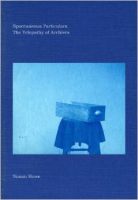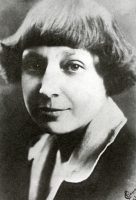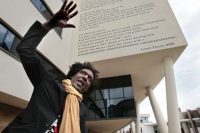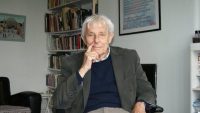|

[Hardcover] Penguin Press, 96 pp., $24.95
In this stunning collection of new poems, Mary Oliver returns to the imagery that has defined her life’s work, describing with wonder both the everyday and the unaffected beauty of nature. Herons, sparrows, owls, and kingfishers flit across the page in meditations on love, artistry, and impermanence. Whether considering a bird’s nest, the seeming patience of oak trees, or the artworks of Franz Marc, Oliver reminds us of the transformative power of attention and how much can be contained within the smallest moments. At its heart, Blue Horsesasks what it means to truly belong to this world, to live in it attuned to all its changes. Humorous, gentle, and always honest, Oliver is a visionary of the natural world.
[Paperback] Freight Books, 256 pp., $15.95
A major collection of contemporary Palestinian poetry translated by 24 of Scotland's very best writers including Alasdair Gray, Liz Lochhead, James Robertson, Jackie Kay, William Letford, Aonghas MacNeacail, DM Black, Tom Pow, Ron Butlin and John Glenday. A Bird is not a Stone is a unique cultural exchange, giving both English and Arabic readers a unique insight into the political, social and emotional landscape of today's Palestine. Includes both established and emerging Palestinian poets.

[Hardcover] New Directions, 64 pp., $29.95
A rapturous paean to discoveries and archives, gorgeously illustrated. Great American writers—William Carlos Williams, Jonathan Edwards, Emily Dickinson, Noah Webster, Hart Crane, Wallace Stevens, Henry James — all in the physicality of their archival manuscripts (reproduced in beautiful facsimiles here) — are the presiding spirits of Spontaneous Particulars: Telepathy of Archives. Also woven into Susan Howe’s newest book are beautiful photographs of embroideries and textiles from anonymous craftspeople. All the archived materials are links, discoveries, chance encounters, the visual and acoustic shocks of rooting around amid physical archives. These are the telepathies the bibliomaniacal poet relishes.
[Paperback] University of Georgia Press, 88 pp., $17.95
What started out as a way to address dealing with parenting and, in particular, fatherhood, became a series of poems focused on familial roles and situations that are difficult to articulate, even among family members. The poems in Zero to Three mark both the change in the child and in the father, who is also a son himself. The term “zero to three” derives from the developmental period that many clinicians and pediatricians believe is the most fundamental phase for children whose delicate brains are undergoing drastic and formative change. Research also shows that parents undergo formative change alongside their children during this period from conception to toddler age. These poems do not intend to offer a definitive stance on parenting or fatherhood but, rather, to capture an emotional gestational period that extends beyond the womb and exceeds beyond the grave.

[Hardcover] Farrar, Straus and Giroux, 208 pp., $25.00
Filled with haunting and visionary poems, Sailing the Forest is a selection of the finest work from an essential voice in contemporary poetry. Robin Robertson’s deceptively spare and mythically charged work is beautifully brutal, ancient and immediate, and capable of instilling menace and awe into our everyday landscape. These are poems drawn in shadow, tinged with salt and blood, that disarm the reader with their precise language and dreamlike illuminations. Robertson’s unique world is a place of forked storms where “Rain . . . is silence turned up high” and we can see “the hay marry the fire / and the fire walk.”
|













